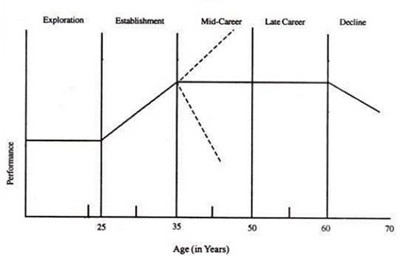- Business Concepts ›
- Human Resources (HR) ›
- Career Stages
Career Stages
Definition, Importance & Example
This article covers meaning & overview of Career Stages from HRM perspective.
What is meant by Career Stages?
Career stages are the various phases through which an employee or a business professional goes through while working through the overall tenure of the career. These career stages highlight the beginning of the job, growth in the organization, middle stages of the career and the last & decline stages of the career leading to retirement.
These stages often derive the overall job satisfaction levels of a person throughout the tenue of the job or career.
The 5 stages in a Career
Let us look at the five main career stages for an employee, professional or even an entrepreneur:
1. Exploration
A career stage that generally ends in the mid-twenties when one makes transition from formal education to job. We start exploring about different career opportunities. Our decision for career gets influenced by parents, peers and the financial resources.
It is a time when a number of expectations about one’s career are developed, many of which are unrealistic.
2. Establishment
This period begins when we start the search of work and also includes accepting the first job, acceptance by peers, learning about the job and gaining the first taste of success or failure in the real world.
Problems in exploration period
1. Finding a niche
2. Making your mark
3. Characterized by making mistakes.
3. Mid-Career
A stage marked by:-
1. Continuous improvement in the performance
2. Levelling off in the performance
3. Beginning of deterioration process
Possible outcomes of mid- career
1. Some employees reach their early goals and go on to even greater heights.
2. Other may suffer from plateaued mid-career
4. Late Career Stage
A career stage in which neither the person is learning about their jobs nor they are expected to outdo their level of performance from previous years. It also has two affects on:
1. Individuals who have grown in mid career stage
2. Individuals who have stagnated or deteriorated
5. Decline (Late Stage)
This the final stage in one’s career which is usually marked by retirement. This is the difficult stage for everyone but hardest for those who have had continued successes in the earlier stages and then comes the time has come for retirement.

Importance of Career Stages
Knowing the career stage for an employee is very important for evaluating a career properly. An average career will show the above stages. The exploration and establishment stages are the most important in defining the career growth in future. If a person is reaching the mid-career stage very early without establishing oneself in the job role then there is an issue which needs to be resolved.
It may be lack of motivation or skill gap. If a person grows even further in mid-career, it is a sign of a good career and vice versa. Most careers would level off and have consistent performance. The career stage would mostly be in sync with job experience and age of the individual.
Career Stage Example
Let us assume Mike worked for a company which provide telecom services. Now Mike joined the company from college as a trainee and quickly 'explored' various departments and found that marketing is where he is best fit. He worked for marketing department for few years aiming for high career growth. After that he 'established' himself well in the marketing department and started contributing to the company.
After spending more years in the marketing department, he got promoted several times and became an important member of the company through the 'mid-career stage' but with no new skills to learn and with change in the consumer behavior and technology landscape, Mike entered the decline stage earlier than expected. He tried improving himself by reskilling and upskilling and kept contributing to the best of capacity till retirement. This is an example of how a person can move through various stages in a career with changing environment and skills.
Hence, this concludes the definition of Career Stages along with its overview.
This article has been researched & authored by the Business Concepts Team which comprises of MBA students, management professionals, and industry experts. It has been reviewed & published by the MBA Skool Team. The content on MBA Skool has been created for educational & academic purpose only.
Browse the definition and meaning of more similar terms. The Management Dictionary covers over 1800 business concepts from 5 categories.
Continue Reading:
What is MBA Skool?About Us
MBA Skool is a Knowledge Resource for Management Students, Aspirants & Professionals.
Business Courses
Quizzes & Skills
Quizzes test your expertise in business and Skill tests evaluate your management traits
Related Content
All Business Sections
Write for Us